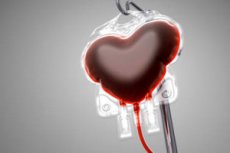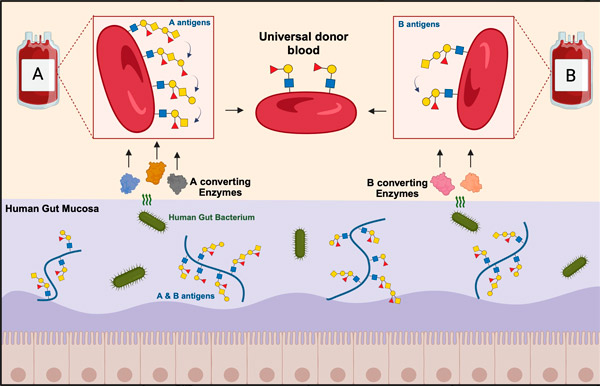Enzymes discovered to create universal donor blood
Sist anmeldt: 14.06.2024

Alt iLive-innhold blir gjennomgått med medisin eller faktisk kontrollert for å sikre så mye faktuell nøyaktighet som mulig.
Vi har strenge retningslinjer for innkjøp og kun kobling til anerkjente medieområder, akademiske forskningsinstitusjoner og, når det er mulig, medisinsk peer-evaluerte studier. Merk at tallene i parenteser ([1], [2], etc.) er klikkbare koblinger til disse studiene.
Hvis du føler at noe av innholdet vårt er unøyaktig, utdatert eller ellers tvilsomt, velg det og trykk Ctrl + Enter.

Researchers from DTU and Lund University have discovered enzymes that, when mixed with red blood cells, are able to remove the specific sugars that make up the A and B antigens in the human ABO blood group system. The results were published in the journal Nature Microbiology.
"For the first time, new enzyme cocktails not only remove the well-known A and B antigens, but also advanced variants not previously recognized as problematic for transfusion safety. We are close to producing universal blood from type B donors, although work remains to be done to transformation of the more complex group A," says Professor Maher Abou Hashem, leader of the research at DTU and one of the lead scientists behind this discovery.
He notes that this discovery was the result of combining the expertise of DTU researchers in enzymes from the human gut microbiota and Lund University researchers in the field of carbohydrate blood groups and transfusion medicine.
High demand for donor blood
Human red blood cells carry specific complex sugar structures (antigens) that determine the four ABO blood groups: A, B, AB and O. These antigens control compatibility between donors and recipients for safe blood transfusion and organ transplantation. Donated blood is tested for disease markers and major blood types and can then be refrigerated for up to 42 days.
The need for donated blood is high due to an increasing proportion of the elderly population and more patients undergoing medical procedures that require significant amounts of blood. Successfully converting blood types A or B into universal ABO donor blood can significantly reduce the logistics and financial costs associated with storing four different blood types.
In addition, the development of universal blood donation will increase the supply of donor blood by reducing the amount of blood approaching expiration.
The need to remove A and B antigens to create universal blood donation is because they can cause life-threatening immune reactions when transfused to inappropriate recipients.
The concept of using enzymes to create universal donor blood was proposed more than 40 years ago. Since then, enzymes with higher efficiency in removing A and B antigens have been discovered, but researchers still cannot explain or eliminate all immune reactions associated with blood, and therefore these enzymes are still not used in clinical practice. p>
Enzymes from the intestines
Research teams from DTU and Lund University have taken a new route to finding enzymes that can remove both blood antigens A and B and the sugars that block them. Research teams have discovered new enzyme mixtures from the gut bacterium Akkermansia muciniphila, which feeds by breaking down the mucus that coats the surface of the intestines.
These enzymes turned out to be extremely effective because the complex sugars on the surface of the intestinal mucosa are chemically similar to those found on the surface of blood cells.
“The peculiarity of the mucous membrane is that the bacteria that can live on this material often have specially selected enzymes to degrade the sugar structures of the mucous membrane, including ABO blood group antigens. This hypothesis turned out to be correct,” says Hashem. p>
The researchers in this study tested 24 enzymes, which they used to process hundreds of blood samples.

ABO blood group antigens, found on the surface of red blood cells, are also present on the intestinal mucosa. The researchers used a specialized gut bacterium and its ability to use these antigens as nutrients to develop two enzyme mixtures that convert group A and B red blood cells into universal donor blood. Graphics: Matthias Jensen, postdoc at DTU. Source: Matthias Jensen, postdoc at DTU.
"Universal blood will create a more efficient use of donor blood and will also help avoid transfusion errors with incompatible ABO groups, which could otherwise lead to potentially fatal consequences for the recipient.
“When we can create a universal ABO blood donation system, we will simplify the logistics of transporting and using safe blood products while minimizing blood loss,” says Professor Martin L. Olsson, leader of the study at Lund University.
Researchers from DTU and Lund University have applied for a patent on the new enzymes and their processing method, and expect further progress in this direction in their new joint project over the next three and a half years. If successful, the concept must be tested in controlled clinical trials before it can be considered for commercial production and clinical use.
